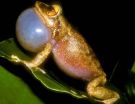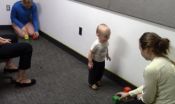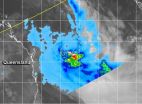(Press-News.org) Northwestern Medicine scientists are continuing to unravel the molecular changes that underlie one of the world's deadliest and most infamous respiratory infections.
When the bacterium Yersinia pestis enters the lungs, it causes pneumonic plague, a disease that is 100 percent fatal if untreated. The way in which Y. pestis evades the immune system and kills people in a matter of days has largely confounded scientists, until now.
Following a 2007 study demonstrating that the presence of a protein called the plasminogen activator protease (Pla) is required for Y. pestis to live inside the lungs, Wyndham Lathem, PhD, assistant professor in Microbiology-Immunology, has found what role Pla plays during disease.
The activator shuts down a molecule, Fas ligand (FasL), which stimulates a form of programmed cell death known as apoptosis. The result is a disrupted immune response during infection. This allows Y. pestis to overwhelm the lungs, causing death.
"This is the first time anyone has shown how bacteria can subvert apoptotic cell death by directly destroying Fas ligand," said Lathem, a member of the Center for Genetic Medicine and Interdepartmental Immunobiology Center.
The findings were published April 9 in Cell Host & Microbe.
To study its effects, scientists added Pla to glass slides with various fluorescently-tagged proteins. If the protease showed an affinity for a specific protein, it would chew off pieces, making it appear less florescent when viewed under a microscope.
"We knew that Pla must be chopping up host proteins in some manner and we looked to discover exactly what proteins were being affected," said first author Adam Caulfield, a research associate in Lathem's lab.
"As we reviewed possible hits, the 'aha moment' came when we saw Fas ligand on the list of affected proteins, because we know Fas is an integral receptor for controlling cell death," said Lathem. "The process of Pla degrading Fas ligand effectively prevents the lungs from being able to clear the infection."
After verifying their findings using cell cultures, Lathem conducted preclinical tests using mice, arriving at the same conclusion.
"Now that we have identified this as a method by which plague bacteria can manipulate the immune system, we have something to look for when studying other respiratory infections," Lathem said. "This could be a common feature, where we see other bacteria manipulating cell death pathways by altering Fas signaling."
Pneumonic plague is unique in that it is the only type of plague with an ability to spread from person to person. It is treatable if caught early, but after 24 hours, antibiotics are rendered useless.
Lathem believes that a restoration of Fas signaling may give antibiotics more time to work, and scientists in his lab are exploring that possibility. They will also be looking at different bacterial infections to see if any manipulate cell death by altering Fas signaling in a similar manner.
INFORMATION:
The work was supported by National Institute of Allergy and Infectious Diseases at National Institutes of Health grants T32 AI007476 and R01 AI093727.
Plague alters cell death to kill host
Scientists discover how bacteria Y. pestis overwhelms the lungs to cause pneumonic plague
2014-04-14
ELSE PRESS RELEASES FROM THIS DATE:
Climate change a likely culprit in coqui frog's altered calls, say UCLA biologists
2014-04-14
Changes in the Puerto Rican climate over the past three decades have caused small but significant changes to the coqui frog, the territory's national animal. UCLA biologists have found that not only have male coquis become smaller, but their mating call has also become shorter and higher pitched.
Authored by Peter Narins, UCLA distinguished professor of integrative biology and physiology and of ecology and evolutionary biology, and Sebastiaan Meenderink, a UCLA physics researcher, the study examined 170 male coqui frogs (Eleutherodactylus coqui) in 1983 and then 116 ...
Making dams safer for fish around the world
2014-04-14
RICHLAND, Wash. – Think of the pressure change you feel when an elevator zips you up multiple floors in a tall building. Imagine how you'd feel if that elevator carried you all the way up to the top of Mt. Everest – in the blink of an eye.
That's similar to what many fish experience when they travel through the turbulent waters near a dam. For some, the change in pressure is simply too big, too fast, and they die or are seriously injured.
In an article in the March issue of the journal Fisheries, ecologists from the Department of Energy's Pacific Northwest National ...
Cosmic slurp
2014-04-14
Somewhere in the cosmos an ordinary galaxy spins, seemingly at slumber. Then all of a sudden, WHAM! A flash of light explodes from the galaxy's center. A star orbiting too close to the event horizon of the galaxy's central supermassive black hole is torn apart by the force of gravity, heating up its gas and sending out a beacon to the far reaches of the universe.
In a universe with tens of billions of galaxies, how would we see it? What would such a beacon look like? How would we distinguish it from other bright, monumental intergalactic events, like supernovas?
"Black ...
Researchers identify children with emotional behavior difficulties
2014-04-14
Research on children orphaned by HIV/AIDS in South Africa may provide insight on how to identify and help children with emotional behavior issues in other areas of the world, which may have limited access to healthcare and further research that could lead to successful interventions.
A report on the global AIDS epidemic published by the United Nations mentions that due to the HIV/AIDS pandemic, which has left 12 million children orphaned in Sub-Saharan African, children are at an increased risk for mental health problems.
"There has been a big push to understand what ...
Henry Ford Hospital hits new heart valve surgery milestone
2014-04-14
DETROIT – Doctors at Henry Ford Hospital reached a medical milestone April 3, performing the 25th successful transcatheter valve replacement using a novel way to access the heart.
Henry Ford is the only hospital in the United States performing the unique procedure called transcaval valve replacement, which accesses the heart by temporarily connecting major blood vessels.
Northern Michigan resident Viola Waller, 80, underwent Henry Ford's first transcaval procedure on July 3, 2013 when traditional valve replacement was not medically viable.
"Nobody could help me here," ...
Dog ownership benefits families of children with autism, MU researcher finds
2014-04-14
COLUMBIA, Mo. –Many families face the decision of whether to get a dog. For families of children with autism, the decision can be even more challenging. Now, a University of Missouri researcher has studied dog ownership decisions in families of children with autism and found, regardless of whether they owned dogs, the parents reported the benefits of dog ownership included companionship, stress relief and opportunities for their children to learn responsibility.
"Children with autism spectrum disorders often struggle with interacting with others, which can make it difficult ...
Rare bone diseases and their dental, oral and craniofacial manifestations
2014-04-14
Alexandria, Va., USA – The International and American Associations for Dental Research (IADR/AADR) have published a paper titled "Rare Bone Diseases and Their Dental, Oral, and Craniofacial Manifestations." The complete review by researchers Sunday O. Akintoye, Andrea B. Burke, Alison M. Boyce, Michael Collins, Brian L. Foster, Rachel I. Gafni, Janice S. Lee, Mary Scott Ramnitz, Martha J. Somerman and J. Timothy Wright is published in the OnlineFirst portion of the IADR/AADR Journal of Dental Research (JDR).
Hereditary diseases affecting the skeleton are heterogeneous ...
Researchers describe 4 new species of 'killer sponges' from the deep sea
2014-04-14
MOSS LANDING, CA — Killer sponges sound like creatures from a B-grade horror movie. In fact, they thrive in the lightless depths of the deep sea. Scientists first discovered that some sponges are carnivorous about 20 years ago. Since then only seven carnivorous species have been found in all of the northeastern Pacific. A new paper authored by MBARI marine biologist Lonny Lundsten and two Canadian researchers describes four new species of carnivorous sponges living on the deep seafloor, from the Pacific Northwest to Baja California.
A far cry from your basic kitchen sponge, ...
Babies prefer fairness -- but only if it benefits them -- in choosing a playmate
2014-04-14
A couple of years ago a University of Washington researcher who studies how children develop social behaviors like kindness and generosity noticed something odd. The 15-month-old infants in her experiments seemed to be playing favorites among the researchers on her team, being more inclined to share toys or play with some researchers than others.
"It's not like one experimenter was nicer or friendlier to the babies – we control for factors like that," said Jessica Sommerville, a UW associate professor of psychology. She took a closer look at the data and realized that ...
NASA sees Tropical Cyclone Ita over the Coral Sea
2014-04-14
Tropical Cyclone Ita made landfall in northeastern Queensland, Australia on April 11 as a powerful Category 4 hurricane on the Saffir-Simpson scale, moved south and re-emerged in the Coral Sea on April 14 where NASA's TRMM and NASA-NOAA's Suomi NPP Satellites captured imagery of the weakened storm.
The VIIRS instrument aboard NASA-NOAA's Suomi NPP satellite captured a visible look at Ita's elongating structure on April 14 at 4:12 UTC/12:12. The Visible Infrared Imaging Radiometer Suite (VIIRS) instrument collects visible and infrared imagery and global observations of ...
LAST 30 PRESS RELEASES:
New study reveals how a key receptor tells apart two nearly identical drug molecules
Parkinson’s disease triggers a hidden shift in how the body produces energy
Eleven genetic variants affect gut microbiome
Study creates most precise map yet of agricultural emissions, charts path to reduce hotspots
When heat flows like water
Study confirms Arctic peatlands are expanding
KRICT develops microfluidic chip for one-step detection of PFAs and other pollutants
How much can an autonomous robotic arm feel like part of the body
Cell and gene therapy across 35 years
Rapid microwave method creates high performance carbon material for carbon dioxide capture
New fluorescent strategy could unlock the hidden life cycle of microplastics inside living organisms
HKUST develops novel calcium-ion battery technology enhancing energy storage efficiency and sustainability
High-risk pregnancy specialists present research on AI models that could predict pregnancy complications
Academic pressure linked to increased risk of depression risk in teens
Beyond the Fitbit: Why your next health tracker might be a button on your shirt
UCSB scientists bottle the sun with liquid battery
Lung cancer drug offers a surprising new treatment against ovarian cancer
When consent meets reality: How young men navigate intimacy
Siemens Healthineers and Mayo Clinic expand strategic collaboration to enhance patient care through advanced technology
Physicists develop new protocol for building photonic graph states
OHSU-led research initiative examines supervised psilocybin
New review identifies pathways for managing PFAS waste in semiconductor manufacturing
New research finds state-level abortion restrictions associated with increased maternal deaths
New study assesses potential dust control options for Great Salt Lake
Science policy education should start on campus
Look again! Those wrinkly rocks may actually be a fossilized microbial community
Exposure to intense wildfire smoke during pregnancy may be linked to increased likelihood of autism
Children with Crohn’s have distinct gut bacteria from kids with other digestive disorders
Genomics offers a faster path to restoring the American chestnut
Caught in the act: Astronomers watch a vanishing star turn into a black hole
[Press-News.org] Plague alters cell death to kill hostScientists discover how bacteria Y. pestis overwhelms the lungs to cause pneumonic plague







